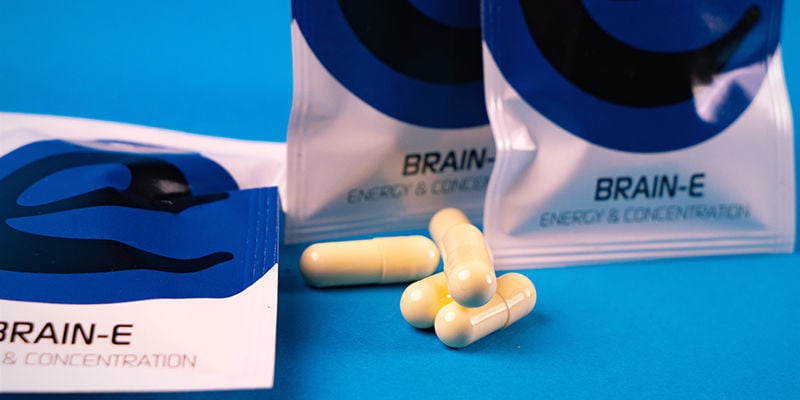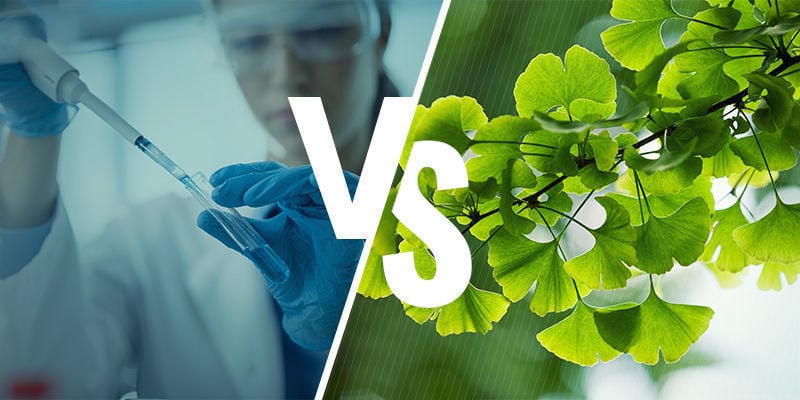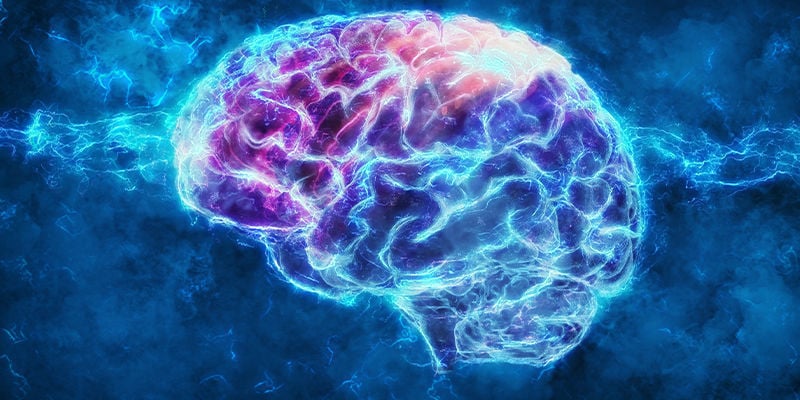
What Are Nootropics And How Do They Work?
In a world where it feels like every moment counts, we're often worried about missing crucial information or not performing at our best, especially in a work or education environment. This is where nootropics come into play. We delve into exactly what these supplements can do for you, and how they have risen to prominence in recent years.
Whether you know them as “smart drugs” or “cognitive enhancers”, nootropics are hugely popular supplements among certain groups. With the potential to boost cognitive performance, memory, and motivation, there's little wonder as to why they're so sought after. So, join us as we dive into the science behind nootropics and how they work.
What are nootropics?

First things first—what are nootropics? Simply put, a nootropic is a substance, or multiple substances, used to boost brain function, energy, alertness, etc.—to gain a mental “edge”. It could be something as simple as caffeine, which provides a little boost. However, more often than not, nootropics harness a variety of more-or-less common ingredients to create a smart drug with multifaceted properties.
The term nootropic itself was coined by Dr Corneliu E Giurgea in 1972 by combining the Greek words for “mind” (nous) and “to bend” (trepein) to describe substances that impact the mind. Although literally translated as “mind-bending”, nootropics are not used to get high. Instead, their use is more akin to microdosing psychedelics than tripping.
Indeed, some of the popularity of nootropics can be credited to entrepreneurs and creatives working in Silicon Valley and other tech hotspots, where individuals look to use their brains at full capacity for the longest time possible.
Another reason for their popularity stems from the (albeit highly exaggerated) plot of the movie Limitless, as well as numerous clinical studies and personal accounts on their benefits. This has led to a boom in the nootropics market, wherein many companies are now creating their own concoctions by combining many different compounds to appeal to all preferences, needs, and requirements.
Synthetic vs natural nootropics

Nootropics can be broken down into two main categories: synthetic and natural.
Synthetic nootropics consist of compounds created in a laboratory setting. These compounds act to mimic those naturally found in plants and herbs, as well as those made in the body.
Synthetic nootropics are often subject to extensive testing before being sold to the general public. Some synthetic nootropics of note include racetams, ampakines, and armodafinil, all of which assert the potential to enhance memory, wakefulness, mood, or other elements of cognitive performance.
Natural nootropics, on the other hand, harness compounds found in nature, such as those from plants, herbs, and natural oils. These compounds can be purchased in their natural form to be used as a standalone nootropic, or pressed into a powder or liquid for easier consumption. Some natural nootropics of note include coffee, omega-3, and ginkgo biloba.
Why take nootropics?

There are many reasons people use nootropics in daily life. Those seeking a viable way to enhance mental function, focus, motivation, and even physical energy—while potentially reducing the impact of oxidative stress and cognitive decline—often use one or more nootropics to give themselves a boost when needed.
Whether this is for a university student studying for an exam or someone looking to reach their full potential in the workplace, for the healthy individual, there are many different reasons to take nootropics.
Although studies are in their infancy, research suggests that some people actually take “prescription nootropics” (aka prescription drugs with nootropic properties) to counteract the symptoms of certain medical conditions. These drugs are not marketed as nootropics, and more research needs to be carried out before any concrete evidence or testimonials can be provided, but those with attention deficit hyperactivity disorder (ADHD), narcolepsy, and early-onset Alzheimer's disease, among other conditions, are interested to see what the science says on the potential of nootropics.
What are the best nootropic ingredients?

Using a combination of synthetic and/or natural ingredients, nootropics tend to be produced with a specific use in mind. With each ingredient geared to bring a distinct benefit, it's a finely tuned process. Of course, you may be thinking, “If they're all supposed to be good for you, why not put in as many as you can?”.
While this is a fair question, it can be seen as excessive. Part of the success of a nootropic formula is based on the interplay between the different ingredients. Though some people do take nootropic stacks—a combination of several nootropics—this must be done with knowledge concerning their different effects.
As a rule of thumb, nootropics typically contain several similar ingredients geared to improve a certain function; memory, for example. So be aware when looking to purchase a nootropic for a specific goal.
Some of the more popular ingredients for nootropics include magnesium, lion's mane mushroom extract, and vitamin B, to name but a few.
How nootropics work

Now that we have an understanding of what nootropics are and what they may contain, how do they actually work? This is a loaded question, as it can’t be answered in a single sentence or two. Essentially, we need to discuss how the brain functions to make sense of how nootropics can potentially impact it. This is, of course, no easy feat, as the brain alone is a complex organ. That said, in what follows, we do our best to break it down.
The brain relies on many different factors to function correctly. As a hugely demanding part of our body, it consumes roughly 20% of the body's daily energy requirements. The brain produces various chemicals related to attention span, relaxation, memory, and cognitive function in general. As mentioned, the compounds in nootropics can be seen as “fuel” for our brains. In theory, the right combination should provide the extra energy our brain needs to function at its highest level, allowing it to perform better and process more. There are numerous different outcomes nootropics can have on the brain; let's take a look at some of the most crucial.
Learning and memory
Some nootropics aim to improve a user's mental function as well as short and long-term memory. This is achieved in part by increasing blood flow to the brain, allowing the user to potentially improve their learning capacity. As discussed, nootropics are highly favoured by students for these reasons.
Motivation and mood

Another aspect nootropics cater for is motivation. Lack of motivation is often a result of a low amount of dopamine. However, dopaminergic nootropics containing L-theanine may cause an increase in motivation and a boost in mood among users.
Focus
Much like learning and memory, a person's focus can also be heavily impacted by nootropics. However, it's not a “one-size-fits-all” situation, as different ingredients are more viable than others in this regard. Rhodiola rosea, for example, has the potential to increase focus and concentration.
When to take nootropics?

Whether it's your first foray into the world of nootropics or you’re looking to dive even deeper, it's essential to first gain an understanding of why you're taking nootropics. As mentioned, “prescription nootropics” are actually just medications with nootropic qualities prescribed by a medical professional for a range of physical and mental health conditions. At present, there is no prescription for nootropics for healthy individuals, and the term nootropic itself has yet to be deemed medically viable.
That's not to say there aren't possible benefits to be found in using widely available nootropic supplements in an everyday setting. It's certainly not uncommon to experience brain fog or lack of motivation during a workday. This is where nootropics can potentially step in to help out.
Of course, something as simple as having a coffee in the morning or afternoon can provide a little boost, as caffeine is indeed a nootropic. However, while this might have an impact on energy level, it may not have the desired effect you're after. This is where other supplements can be used instead, or in tandem.
Will nootropics keep you awake?

As nootropics act to stimulate the brain in various ways, they have the potential to keep energy levels high at inopportune times. While this boost might be a good thing during the day, it's possible it may have an impact on a user's sleeping pattern. As a means to combat this, it's often advisable to take your supplement in the morning so the effects wear off by the time you want to relax after work.
Are nootropics safe?
Overall, nootropics appear generally safe to use, but it's entirely possible to experience side effects, as each substance has a different profile of benefits and drawbacks. While side effects are often mild, for those allergic or intolerant to certain substances, be very careful when shopping around.
However, much like with all supplements, it’s important not to exceed the recommended dosage. This in itself helps to ensure adverse effects are mostly mitigated. As the nootropics industry is relatively new, research is still being carried out to fully understand every aspect of these substances. Those looking for additional advice on safety should consult their doctor before taking nootropics.
As research continues, we're confident we'll see some exciting developments in the world of smart drugs. As with most things in life, it's crucial to find the best nootropics for your needs. While some will look to nootropics as a more permanent solution, they all differ in the recommended amount of time you should use them. So be sure to carry out relevant research before taking the plunge.
-
 5 min
June 29, 2021
What Are The Effects Of Caffeine On Studying?
If you're wondering how to use caffeine to maximise your studying potential, then you've come to the right place! As with all drugs, there are optimal amounts that make good results more likely....
5 min
June 29, 2021
What Are The Effects Of Caffeine On Studying?
If you're wondering how to use caffeine to maximise your studying potential, then you've come to the right place! As with all drugs, there are optimal amounts that make good results more likely....
-
 5 min
July 25, 2019
The Best Alternatives To Coffee: Natural Ways To Boost Energy
Although it may be hard to believe, not everybody is a fan of coffee. In case you happen to be one of those people, here is a list of perfect alternatives to the famous caffeinated beverage. Some...
5 min
July 25, 2019
The Best Alternatives To Coffee: Natural Ways To Boost Energy
Although it may be hard to believe, not everybody is a fan of coffee. In case you happen to be one of those people, here is a list of perfect alternatives to the famous caffeinated beverage. Some...











 United States
United States








